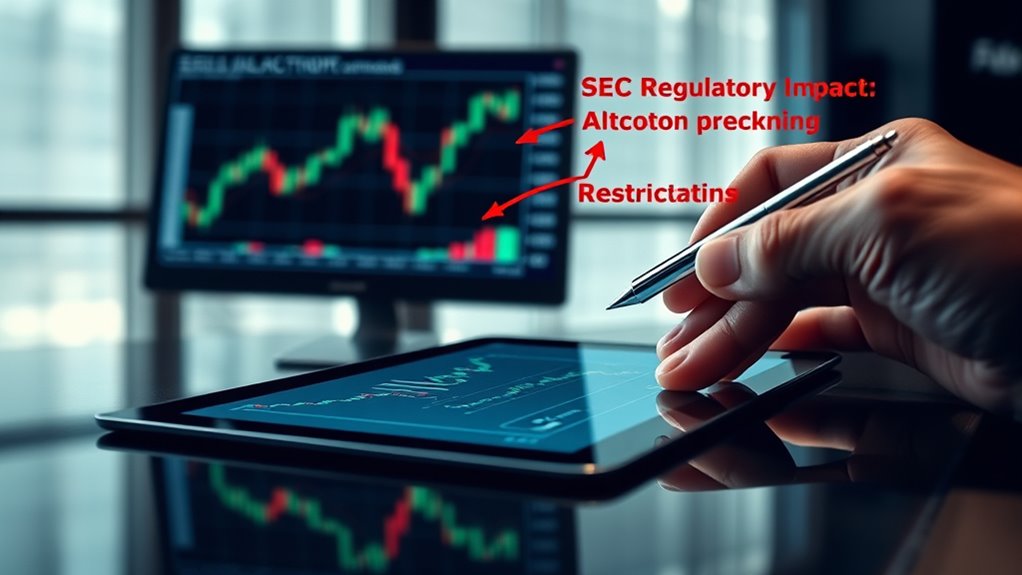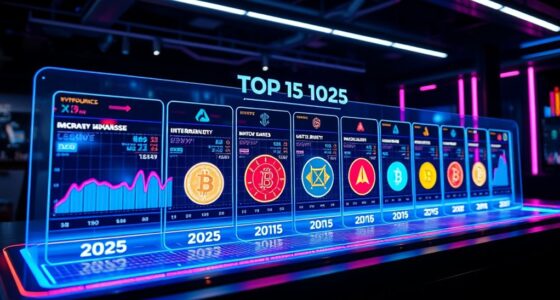The SEC’s crackdown on altcoins means you need to pay close attention to how tokens are classified. If a token is deemed a security, it faces strict rules about trading and disclosure, which can impact your investments’ legality and value. Many projects are restructuring to avoid this label, making transparency vital for investors. Staying informed helps you navigate potential risks, and exploring further will reveal how these changes can affect your holdings and opportunities.
Key Takeaways
- The SEC’s focus on classifying tokens as securities increases regulatory risks for altcoin investors.
- Tokens deemed securities must comply with strict laws, affecting their trading and holding.
- Investors should scrutinize project disclosures, whitepapers, and team credentials for compliance risks.
- Projects are restructuring or rebranding to avoid security classification and related legal penalties.
- Staying informed about evolving regulations helps investors mitigate legal and market risks.

The SEC has recently intensified its crackdown on altcoins, signaling a shift in regulatory scrutiny that could reshape the cryptocurrency landscape. As an investor, this means you need to pay close attention to how cryptocurrencies are classified and what it takes to stay compliant. Cryptocurrency compliance isn’t just about following the rules; it’s about understanding how different tokens are categorized under existing regulations. The SEC’s focus on token classification aims to determine whether a particular altcoin qualifies as a security, which has major implications for how you can buy, sell, and hold these assets. If a token is deemed a security, it must adhere to strict regulations similar to those governing stocks and bonds. Failing to recognize these distinctions can expose you to legal risks and potential penalties.
The SEC’s crackdown on altcoins emphasizes the importance of understanding token classification and regulatory compliance for investors.
This renewed regulatory focus is forcing projects to clarify their tokens’ roles and functions. If an altcoin is considered an investment contract or offers profit expectations based on the efforts of others, it’s more likely to be classified as a security. As an investor, this means you might see increased transparency requirements and more rigorous disclosures from altcoin issuers. It’s essential to stay informed about how the SEC defines and categorizes various tokens because misclassification can lead to legal complications, halting trading, or even delisting from exchanges. The SEC’s actions are pushing projects to reevaluate their token structures, often leading to rebranding or restructuring to avoid security classification. Additionally, the evolving regulatory landscape underscores the importance of understanding AI security concerns that could influence the development and regulation of digital assets.
For you, this regulatory environment means exercising caution before investing in new or lesser-known altcoins. Scrutinize the project’s whitepapers, team credentials, and how they describe their tokens. Are they emphasizing utility, or are they promoting investment potential? These clues can help you gauge whether the token risks being labeled a security. Furthermore, you should verify whether the token complies with applicable securities laws, especially if it’s listed on exchanges that operate under strict U.S. regulations. Non-compliance can lead to delisting or legal scrutiny that could wipe out your investment.
Ultimately, understanding the evolving landscape of cryptocurrency compliance and token classification arms you with better decision-making tools. As the SEC tightens its grip, it’s crucial to stay informed and cautious. Being aware of how tokens are classified and ensuring the projects you support adhere to regulatory standards helps protect your investments and keeps you one step ahead in this rapidly changing environment.
Frequently Asked Questions
How Will New Regulations Affect Existing Altcoin Investments?
Your existing altcoin investments might face stricter rules due to new regulations. You’ll need to guarantee regulatory compliance to avoid legal issues or penalties. These regulations aim to promote market stability but could also lead to increased volatility if some tokens are deemed non-compliant. Staying informed and adjusting your holdings accordingly helps you navigate these changes, protecting your investments and benefiting from a more secure, stable market environment.
Are All Altcoins Equally at Risk of SEC Enforcement Actions?
Like Icarus flying too close to the sun, not all altcoins face the same risk. Your risk depends on their token classification and how the enforcement scope is applied. Coins labeled as securities are more likely to attract SEC attention, while utility tokens may escape scrutiny. Stay vigilant, as regulatory focus shifts and enforcement scope widens, making some altcoins riskier investments than others.
What Are the Legal Implications for Investors Holding Unregulated Tokens?
Holding unregulated tokens can expose you to legal risks due to uncertain token classification and lack of regulatory compliance. If authorities determine your tokens aren’t compliant, you might face penalties, asset freezes, or even loss of your investments. To protect yourself, stay informed on evolving regulations, verify your tokens meet legal standards, and consult legal experts. This proactive approach helps safeguard your assets amid regulatory uncertainties.
How Can Investors Ensure Their Altcoin Holdings Comply With Upcoming Rules?
You can stay ahead by prioritizing tax compliance and doing thorough due diligence on your altcoin holdings. Regularly review regulatory updates, consult legal or financial experts, and maintain detailed records of your transactions. This proactive approach helps guarantee your investments align with upcoming rules, reducing risks of penalties. By staying informed and cautious, you’ll better navigate the evolving landscape and protect your assets from unforeseen legal complications.
Will SEC Crackdowns Lead to a Complete Ban on Certain Altcoins?
Yes, SEC crackdowns could lead to bans on some altcoins, especially those lacking investor protections. This regulatory uncertainty makes it risky to hold certain tokens, as authorities might restrict or delist them. To protect yourself, stay informed about evolving rules, diversify your holdings, and choose altcoins with clear legal status and strong investor protections. Being proactive helps you navigate potential bans and minimize losses during regulatory shifts.
Conclusion
As you navigate this evolving landscape, think of the SEC’s crackdown as a vigilant lighthouse guiding ships through turbulent waters. While it may seem intimidating, it’s designed to steer you away from hidden rocks and toward safer harbors. Stay informed, adapt your strategies, and remember that even in stormy seas, cautious sailors reach their destination. Embrace this regulation as a compass, helping you chart a more secure course through the tumultuous world of altcoins.









